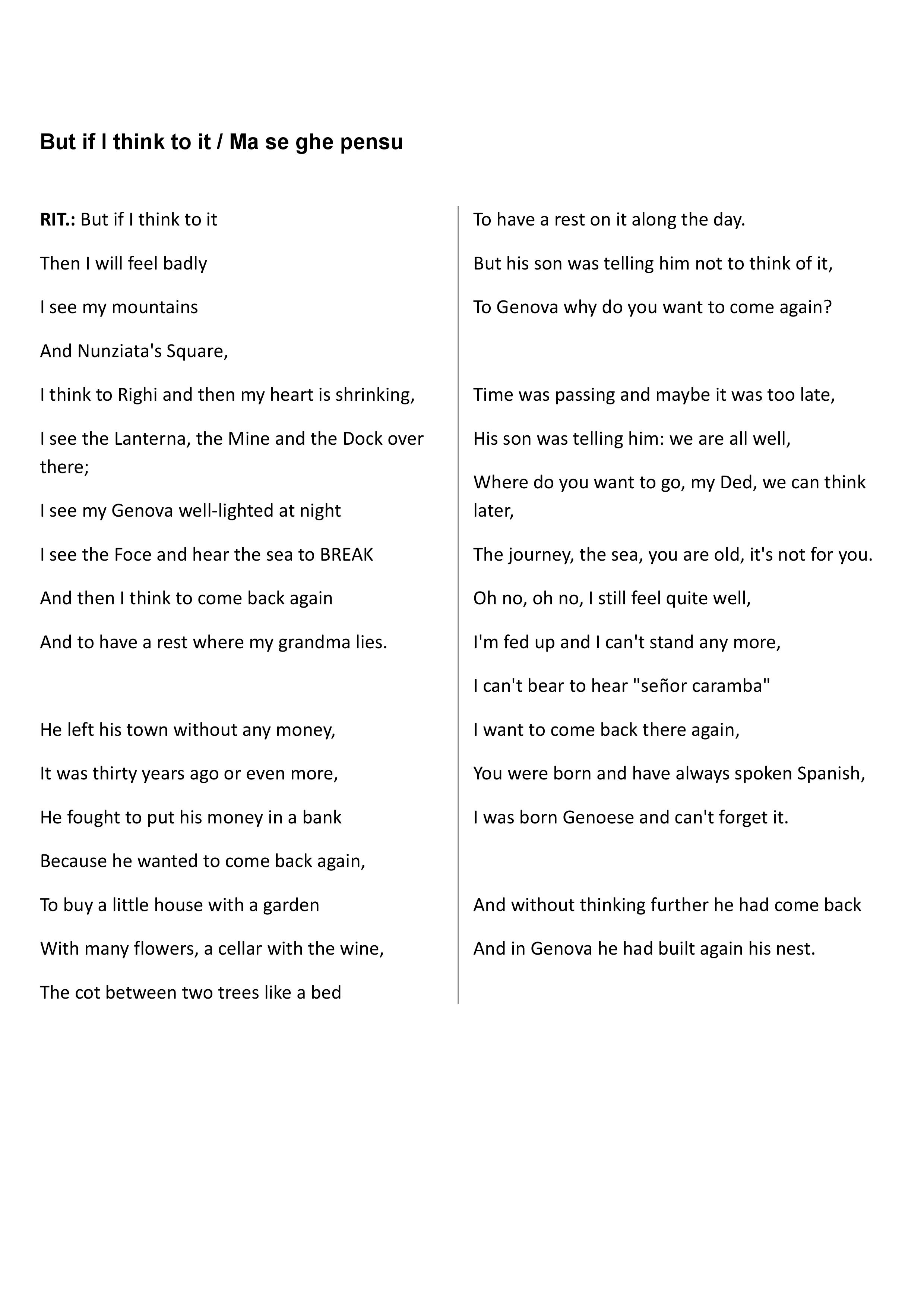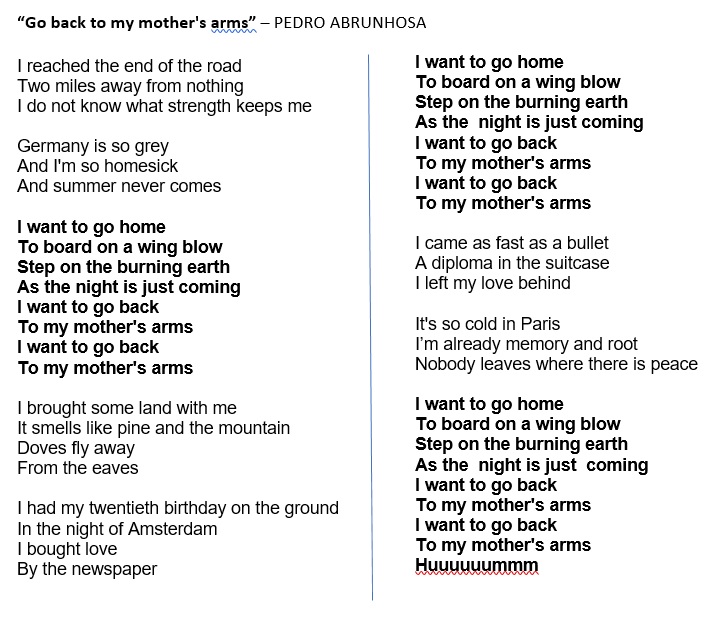In this page our students sing some songs about migrations.
Students from Genova sing a traditional song about a man who went from Genova to Argentina and, getting old, he thinks to come back to his native town.
This is the version sung by a famous italian singer, Mina:
And this is the English translation from the original song in dialect:

This is a portuguese song about a young emigrant that is "homesick" ("saudade", the portuguese word that has no translation) want's to go back to his mother's arms.
“To go back to my mother's arms” – PEDRO ABRUNHOSA
Portuguese students sing this song in portuguese and english:
The English translation of portuguese song:

A famous Bulgarian song about a migrant who wants to come back to his native country.
This is the version sung by a famous Bulgarian singer Emil Dimitrov.
My country, my Bulgaria
How many nights I didn`t sleped,
How many paths I walked
To get back.
How many songs I sang,
How many grief I lived
To get back.
In my beautiful country
mother, father and woman
to hug
There under the home sky
waits my child
To get back.
My country, my Bulgaria.
My love, my Bulgaria.
My sadness, my Bulgaria
To you the love eternal brings me back.
Even somewhere in the world
unknown to die
Let the home fields
welcome me with the song
When I get back...
My country, my Bulgaria.
My love, my Bulgaria.
My sadness, my Bulgaria
To you the love eternal brings me back.
My country, my Bulgaria.
my beautiful country
I`ll be back
I`ll be back.
In my beautiful country
The grass and the soil
to hug.
Let me be a flower
Let the wind known
hugs me.
“Oblache le byalo” (Little white cloud) is a lovely Bulgarian song, written by celebrated Bulgarian children’s author Ran Bosilek while he was working in Belgium and pining for home. Since the early 20th century this song has been the unofficial anthem of Bulgarian emmigrants everywhere. And a lot of us are emmigrants: displaced by political or economic factors, some 2 million Bulgarians (more than 20%) live outside the country.
Sylvie Vartan was born in 1944 (the 15th of august) in Iskretz, a small town in the Balkans, in Bulgaria.
The difficult life in Bulgaria was the reason, the Vartans had to think about emigration. Because of their love of France that they got from Robert, (Sylvie's grandfather), Paris naturally came to their mind. The departure was scheduled for December of 1952. Sylvie remembers when they left, her grandfather couldn't go with them but he ran after the train.
Sylvie learned French in two years. At school, her classmates treated her like she was different which she couldn't stand. So she had to work much harder than the others to keep up with the school work.
In all those years, Sylvie, who left Bulgaria at the age of 8, had never been able to return owing to the political situation back in Bulgaria. After the fall of Communism in 1989, she planned a return concert in Sofia. On October 6, 1990, just shy of 38 years after leaving the country, she addressed the packed Concert Hall 1 of the National Palace of Culture in flawless Bulgarian, holding back tears of joy that she was back on Bulgarian soil. Then she opened with this song.
Little white cloud
Tell me, please, little white cloud,
Where you come from, where have you flown?
Didn't you see my father’s house
And didn't you hear my mother talking:
- What’s doing my dear child,
Sharing stranger’s bread with strangers?
Tell her, little white cloud,
That you’ve seen me here alive and in good health.
And send her greetings from me,
Too much time passed, little more left.
It comes time to come back to my village;
To come back and embrace my mother.
It comes time to come back to my village;
To come back and embrace my mother.
To come back and embrace my mother.
"Hava Nagila" (Hebrew: הבה נגילה, Havah Nagilah, "Let us rejoice") is an Israeli folk song traditionally sung at Jewish celebrations. It is perhaps the first modern Israeli folk song in the Hebrew language that has become a staple of band performers at Jewish weddings and bar/bat mitzvah celebrations. The melody is based on a Hassidic Nigun and it was composed in 1915 in Ottoman Palestine, when Hebrew was being revived as a spoken language for the first time in almost 2,000 years (since the destruction of the Second Temple in 70 CE). For the first time, Jews were being encouraged to speak Hebrew as a common language, instead of Yiddish, Arabic, Ladino, or other regional Jewish languages. It is sung all over the world, including Bulgaria in different languages.
https://www.youtube.com/watch?v=uSTOcyevIOE
Lyrics
|
Hebrew text
|
Bulgarian
|
|
הבה נגילה
|
Да се радваме,
|
|
הבה נגילה
|
Да се радваме,
|
|
הבה נגילה ונשמחה
|
Да се радваме и ликуваме.
|
|
(припев x 1)
|
|
|
הבה נרננה
|
Да пеем,
|
|
הבה נרננה
|
Да пеем,
|
|
הבה נרננה ונשמחה
|
Да пеем и да ликуваме.
|
|
(припев x 1)
|
|
|
!עורו, עורו אחים
|
Събудете се, събудете се братя!
|
|
עורו אחים בלב שמח
|
Събудете се братя с радостни сърца.
|
|
(припев x 4)
|
|
|
בלב שמח
|
С радостни сърца.
|
|
Transliteration
|
Hebrew text
|
|
English translation
|
|
Hava nagila
|
הבה נגילה
|
|
Let's rejoice
|
|
Hava nagila
|
הבה נגילה
|
|
Let's rejoice
|
|
Hava nagila ve-nismeḥa
|
הבה נגילה ונשמחה
|
|
Let's rejoice and be happy
|
|
|
(repeat)
|
|
|
|
Hava neranenah
|
הבה נרננה
|
|
Let's sing
|
|
Hava neranenah
|
הבה נרננה
|
|
Let's sing
|
|
Hava neranenah ve-nismeḥa
|
הבה נרננה ונשמחה
|
|
Let's sing and be happy
|
|
|
(repeat)
|
|
|
|
Uru, uru aḥim!
|
!עורו, עורו אחים
|
|
Awake, awake, my brothers!
|
|
Uru aḥim be-lev sameaḥ
|
עורו אחים בלב שמח
|
|
Awake my brothers with a happy heart
|
|
|
(repeat line four times)
|
|
|
|
Uru aḥim, uru aḥim!
|
!עורו אחים, עורו אחים
|
|
Awake, my brothers, awake, my brothers!
|
|
Be-lev sameaḥ
|
בלב שמח
|
|
With a happy heart
|
The song of the world
We can find this song in many different languages- Greek, Hebrew, Italian, Bulgarian, Russian , English.
"People Talk About You" - the original is Greek, the music is composed by Stavros Kouummizis, performed by YorgosDalaras. The Jews sing it in Hebrew.The Bulgarian version is performed by Tony Dimitrova, in Russian- by Philip Kirkorov, in Italian, and in English…
The song was written in 1975, shortly after the fall of the Junta. It is about love, unemployment and politics.
Giorgos Dalaras - Ola Kala (original emigrants)
Bulgarian
Toni Dimitrova - За тебе хората говорят - People Talk About You
https://www.youtube.com/watch?v=3u8zZt8Qr5k
Russian
Filip Kirkorov-Мне мама тихо говорила
https://www.youtube.com/watch?v=YKm5FMWVsDQ
Hebrew
HAVA NAGILA DANCE
https://www.youtube.com/watch?v=K2QQESVUw38
Hebrew
Haim Moshe Toda (Thank You)